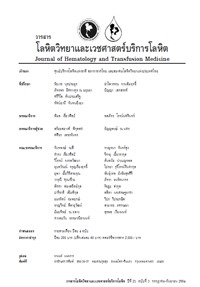Systemic Epstein-Barr Virus-positive T-cell Lymphoproliferative Disease of Childhood
Keywords:
ไวรัส Epstein Barr, มะเร็งต่อมน้ำเหลืองชนิด T cell, วัยรุ่น, Epstein-Barr virus, T-cell lymphoproliferative disease, AdolescenceAbstract
บทคัดย่อ
Systemic Epstein-Barr virus (EBV)-positive T-cell lymphoproliferative disease of childhood เป็นมะเร็งต่อมน้ำเหลืองที่พบน้อยมาก รายงานผู้ป่วยส่วนใหญ่มาจากประเทศในเอเชียโดยเฉพาะญี่ปุ่นและไต้หวันแสดงให้เห็นว่าปัจจัยด้านเชื้อชาติมีความสำคัญมากต่อการเกิดโรค อย่างไรก็ตามยังไม่เคยมีรายงานผู้ป่วยโรคนี้ในประเทศไทยมาก่อน EBV เป็นไวรัสในกลุ่ม herpesvirus ซึ่งทราบกันดีว่าสามารถก่อให้เกิดมะเร็งได้ โดยส่วนใหญ่การติดเชื้อมักจะเกิดกับ B-cell แต่สำหรับโรคนี้จะเกิดการติดเชื้อไวรัส EBV ใน T-cell นำไปสู่การเพิ่มจำนวนเซลล์ซึ่งมาจากต้นกำเนิดเดียวกัน ลักษณะทางคลินิกที่จำเพาะของโรคนี้ คืออาการทรุดลงอย่างรวดเร็วโดยจะมีเม็ดเลือดทุกชนิดต่ำลงอย่างมาก และการทำงานของระบบอวัยวะต่างๆอาจล้มเหลวนำไปสู่การเสียชีวิตภายในช่วงเวลาไม่กี่สัปดาห์หลังมีอาการ ดังนั้นปัจจัยสำคัญคือ การตรวจวินิจฉัยโรคอย่างถูกต้อง รวดเร็ว และการรักษาที่ทันท่วงทีรายงานผู้ป่วย ผู้ป่วยหญิงอายุ 15 ปี มาด้วยอาการไข้สูงและเจ็บคอมา 2 สัปดาห์ ตรวจพบตับม้ามโต และ ภาวะ pancytopenia ผลการตรวจไขกระดูกพบเซลล์ผิดปกติซึ่งมีการแสดงออกของ CD3 และ CD8 ตรวจพบ RNA ของ EBV (EBER) และ monoclonal rearrangement ของยีน T-cell receptor ผู้ป่วยเสียชีวิตหลังจากวินิจฉัยประมาณ 1 เดือน แม้ได้รับการรักษาด้วย monoclonal antibody ต่อ CD52 ยาเคมีบำบัด และยาต้านไวรัส
Key Words : ไวรัส Epstein Barr ; มะเร็งต่อมน้ำเหลืองชนิด T cell ; วัยรุ่น
Abstract
Systemic Epstein-Barr virus-positive (EBV+) T-cell lymphoproliferative disease of childhood is a very rare lymphoma subtype. The majority of patients were reported from Asian countries, especially Japan and Taiwan, strongly suggesting the racial predisposition, while there has been no reported case from Thailand. EBV is a well-known oncogenic herpesvirus, mostly targeting B cells. However, T cells are also the main target of EBV-associated monoclonal T-cell proliferation, which is the distinct characteristic of this fatal entity. Its clinical course demonstrates a rapid progression with severe pancytopenia, fulminant multi-organ failure, and subsequent death, usually within days to weeks. Consequently, prompt diagnosis and treatment is crucial. Case report: A 15-year-old girl presented with high-grade fever and sore throat for 2 weeks. She had marked hepatosplenomegaly and pancytopenia. Bone marrow study was performed and revealed abnormal lymphoid cells expressing CD3, CD8, EBV-encoded RNA (EBER), and monoclonal rearrangement of T-cell receptor (TCR) genes. Unfortunately, she did not respond to multi-modality treatment comprising monoclonal antibody to CD52, chemotherapy, and antiviral drugs, and subsequently died 1 month after diagnosis.
Key Words : Epstein-Barr virus ; T-cell lymphoproliferative disease ; Adolescence



